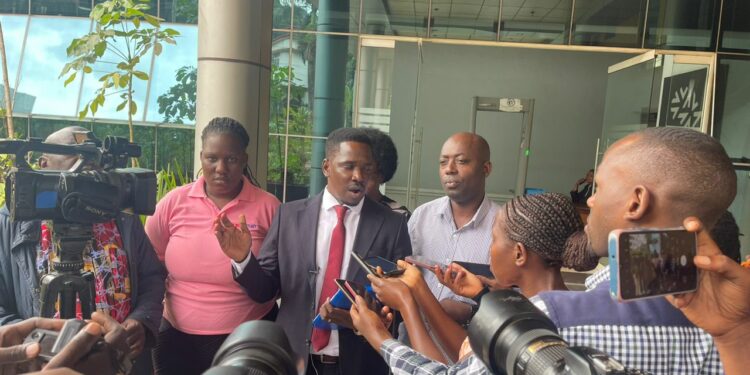The children of a Ugandan migrant worker Milly Namutamba who died in Saudi Arabia are pleading with the government to help repatriate their mother’s body.
Late Namutamba, a Ugandan migrant worker, is believed to have died in 2019 while employed in Saudi Arabia. She had been externalized through Horeb Services Uganda Limited, a labor recruitment agency.
Namutamba’s family lost contact with her in January 2019, just five months after she had left for Saudi Arabia in August 2018. Since then, they have received no official confirmation about her fate, leaving them in distress and uncertainty about the circumstances surrounding her death.
Leading the family’s efforts is Namutamba’s elder daughter, Namale Desire, who is determined to ensure her mother receives a dignified burial in her homeland. After years of waiting, the family finally received a glimmer of hope when High Court Judge Boniface Wamala ruled in their favor on Monday.
Despite this legal victory, the family is still grappling with the challenges of repatriating Namutamba’s body, pleading for the government’s intervention to bring her remains back to Uganda for a proper farewell.
Expressing distress over the prolonged delay and uncertainty surrounding her remains. The family is calling for swift intervention to honor their mother’s final journey home.
“As a family, we are happy with the judgment, it’s a relief to us however we still groan inside because we still don’t know what killed our mother, and we also don’t if she was buried,” she said to media on Tuesday while at Twed Tower Court.
Namale Desire revealed that her mother, Namutamba, had embarked on the journey to the Middle East with hopes of securing a better future for her children. The decision to work abroad was driven by a desire to provide Namale and her siblings with the opportunity to attend school and improve their lives.
However, what the family initially believed would bring financial relief and stability quickly turned into a nightmare. Namutamba’s sudden loss of contact in early 2019, just a few months after her departure, left the family in anguish, fearing the worst as they struggled with the silence and uncertainty surrounding their mother’s fate.
“My mother went to work in a foreign land to secure a future for us, but now she is no more. Although we received a ruling in our favor, we desperately wanted to see her body returned home. My siblings still believe she is alive, but bringing her remains back will provide us with closure and the assurance that we have given her a proper burial,” Namale said.
The Case
On Monday, the High Court ruled in favor of Ms. Namale Desire, the daughter of the deceased migrant worker, in a landmark case emphasizing the critical importance of protecting the rights of women externalized for work in the Middle East.
Ms. Namale Desire sued Horeb Services Uganda Limited and its Director, Mr. Ezra Mugisha, for violating her mother’s right to life while in Saudi Arabia. Desire recounted how her mother, who was in perfect health before leaving for Saudi Arabia, maintained regular communication with her family for five months until she abruptly went silent. Concerned for her mother’s well-being, Namale contacted Horeb Services, but the agency remained unresponsive.
In September 2022, an uncle discovered through unknown sources that Namutamba had died. When they approached Horeb Services for confirmation, the company acknowledged her death but failed to provide details about the circumstances surrounding it.
The High Court delivered a historic judgment, declaring that Horeb Services Uganda Limited and its Director violated Namutamba’s right to life, as enshrined in Article 22 of the Ugandan Constitution. The court held that the recruitment company bore primary responsibility for the safety and well-being of migrant workers it externalized.
The court ordered Horeb Services and its director to pay Namale and her uncle a total of UGX 250 million (approximately USD 66,000) in damages and costs.
“This ruling sends a powerful message: human life is invaluable, and labor recruitment and externalization companies that fail to accept responsibility for the migrant workers they send to the Middle East will not be tolerated,” said Adv. Titus Asiimwe, counsel for Namale and her uncle.
“This victory is a testament to the resilience of survivors and the power of justice. We appreciate the High Court for honoring our call to end impunity among labor recruiters who overlook the suffering of families of women who die in Saudi Arabia,” Namale added.
This decision sets a crucial precedent for labor recruiting agencies, emphasizing their responsibility to protect the rights of migrant workers. It highlights the importance of accountability for human rights violations and aims to ensure justice for survivors and relatives of deceased migrant workers.
Meanwhile, The family remains hopeful that the government will act swiftly to repatriate Namutamba’s remains for a proper farewell.
Do you have a story in your community or an opinion to share with us: Email us at editorial@watchdoguganda.com













